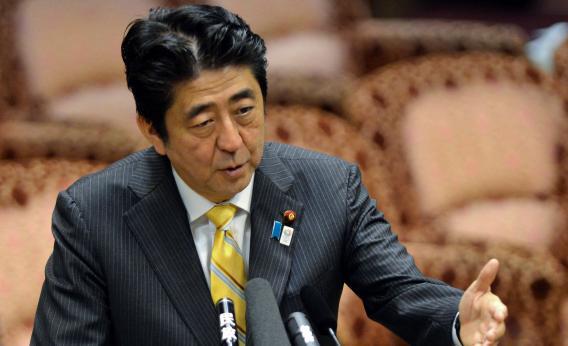Fans of Japanese monetary policy got some odd news during the non-business hours in the eastern time zone. Japan’s new GDP data appears to show a triumph of Abenomics with real GDP growing at an annualized rate of 3.5 percent in the first quarter.
That would be the fastest growth rate in the G7 and it’s particularly impressive because Japan’s slow population growth and declining working age population should lead us to believe that it has a very sluggish underlying potential growth rate. So that’s a huge win for Shinzo Abe and Abenomics.
On the other hand, the GDP Deflator (the broadest possible measure of inflation) fell. In fact, it fell by quite a lot. A surge in real growth paired with a falling rate of inflation is what you would expect to result from a policy of highly effective structural reforms—exactly what Abe stands accused of neglecting in favor of stimulus. At the same time, since the key mechanism of Abenomics was supposed to be breaking the cycle of deflationary expectations this makes Abenomics look ineffective.
And yet the mystery deepens, because when you look at the components of growth—exports followed by residential investment followed by consumer spending with non-residential business investment still weak—that very much looks like a successful program of monetary stimulus rather than a positive supply shock.
All in all, I think you’d have to consider this a win for Abenomics. The goal, after all, is to produce real growth not to produce inflation. If you get the growth, you’re winning. But it is a puzzling scenario and it least raises the possibility that all the good news from Japan over the past six months has been some kind of giant coincidence totally unrelated to the policy experiments taking place. On the other hand, it always strikes me that people who are skeptical of central banks’ ability to raise inflation expectations taking a bizarrely narrow view of the consequences of that. If it’s really true that the Bank of Japan can print all the money and buy all the assets it likes without causing inflation, then that shouldn’t just lead to pessimism about monetary stimulus it should lead to a policy revolution. Why is Japan bothering with taxes if large-scale money-printing is non-inflationary? Huge money-financed tax cuts would operate as simultaneous fiscal stimulus and supply-side reform, and if they can be enacted without any impact on the price level then why not do it? And I mean that quite genuinely. Since debate seems polarized between those who want increased inflation in Japan and those who doubt that increased inflation is possible, it seems like a no-brainer to finance the government with money-creation rather than taxes.
